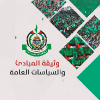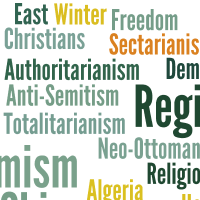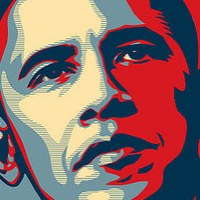![]()
Fri, Oct 28, 2011 | Rubin Reports | By Barry Rubin

Supporters of Tunisia’s Ennahda party celebrate at the party’s headquarters in Tunis after partial results put it far in the lead after Sunday’s elections for a constituent assembly. (AP Photo/Benjamin Girette)
Out of Tune in Tunisia: What’s Really Going on There and Throughout the Arab World
Let’s step back, keep an open mind, avoid stereotypes and preconceptions, and ask: What is the current political situation in Tunisia? Simple. The Islamists aren’t ready for the concert. They are just tuning up. Still, they’ve handed out programs so we should know what’s going to be played.
First and foremost, let’s remember that Tunisia is not going to become a radical Islamist state within the next year. The whole revolution in the Islamist revolution is the understanding — learned largely from Turkey — that the movement can operate by stealth, one step at a time, winning elections, taking over institutions, and only emerging fully at the end of that process.
This does not prove they are moderate; it proves that they are smart. And you know what that proves about those gullible enough to be taken in by the trickery.
Remember what happened with Communism. Karl Marx started by proclaiming that the Communists disdained to conceal their aims and the next thing you know they are all wearing costumes labeled “agrarian reformers,” “progressives,” and moderates.
So far I have not seen a single analyst quoted in any “mainstream” publication warning about the Tunisian Islamists possibly not being moderate. The unanimity of opinions, the lack of doubt, and the censoring out of evidence to the contrary is astonishing. We can’t even get a story that says most people say they are okay while others warn that this isn’t true. If these elements in the Western elite were fish, all anglers wouldn’t need bait, they’d just put a note on the hook saying, “This is not a hook.”
With this kind of start, the fact that the Ennahda party doesn’t start cutting off heads next week will be used by Western governments, experts, and media to “prove” that it’s moderate. And it doesn’t matter if the party’s leader said a few months ago: “Gaza, like Hanoi in the 1960s and Cuba and Algeria, is the model of freedom today” — (Thanks to Martin Kramer for pointing this out.) — because it was in Arabic and no Western media will report it.
That party received 90 of 217 seats in the assembly, just over 40 percent. Therefore, they are short of a majority. Remember that this is just a one-year body to write a new Constitution and to appoint an interim president and government until the real elections. So the party’s strategy is to get as much as possible but not to scare people. Businesses, foreign aid donors, tourists, and others must be kept calm. All the while, the Islamists will work to elect a president and get a parliamentary majority in the future.
Who will they have to work with in the mean time? The Congress for the Republic (CPR) won 30 seats and the Ettakatol won 21 seats. (I cannot resist the temptation to remark that when the Islamists are through with it, Tunisia will definitely need CPR!) These are leftist parties and Ennahda’s coalition partners.
What does this tell us? On social issues, the Islamists will have to be careful but they can find more common ground with the leftists on economic and foreign policy issues. By building the power of the state and weakening the business sector — which the leftists want — Ennahda lays the basis for its future domination of the society through controlling a strong state.
On foreign policy, the left shares the Islamists desire to take a tougher line toward the West and against Israel. In the shorter run, they will not want to antagonize Europe or the United States. But this lays a foundation for a longer-term turn of public opinion against the West and toward other Islamist states. As we saw in Turkey, a stealth Islamist government can turn around public opinion with surprising speed using patriotism and religious fervor.
There’s another hugely important point here: the inability of the anti-Islamist or even non-Islamist parties to unite. The incompetence and divisions among the secular parties in Turkey was a major factor in the Islamists’ triumph. In the Palestinian elections, Fatah candidates ran against each other, split the vote, and ensured the victory of Hamas. In Egypt, three major “liberal” parties are running against each other, ensuring that the Muslim Brotherhood will come in first.
The four main left and liberal parties combined received the same number of seats as the Islamists. Imagine how many they would have won if they could have formed a united front. And, of course, preventing such a front is one of the main incentives for the Islamists to portray themselves as moderates.
As anyone who has ever studied Communism knows, maintaining discipline and ensuring that there is one “party line” is a major reason why anti-democratic political movements can do so well in playing the democratic game.
Now, what party was most militantly anti-Islamist? The Petition for Justice and Development Party, financed by a London-based businessman named Hechmi Haamdi. It gained 19 seats. So this party must be discredited.
How? By charging that it has links to the old regime (which might be true) and disqualifying some of its candidates for “financial irregularities” (which might also be true). But the law can be used disproportionately against the anti-Islamists. Haamdi has since said that his party will withdraw from the assembly which, if true, would strengthen the Islamists’ hand. Another liberal secularist party, the Progressive Democratic Party, came in fourth with 17 seats. Both of the liberal parties refused to join an Islamist-led coalition, which tells you something important about their assessment of “moderate Islamism.”
Watch what happens to the anti-Islamists in Egypt. The Free Egyptians Party, which enjoys Christian support and is running third in the poll, will face serious pressure while the other two “liberal” parties — the opportunistic Wafd and the left-leaning Justice Party — will be invited into a coalition with the Muslim Brotherhood.
Back to Tunisia. Note also that 40 of the 217 seats — more than 20 percent — are held by very small parties () or independents. It will be easier for the Islamists to make deals with some of these. Indeed, it could have gone for a majority that way but wisely preferred to remain cautious.
And when the real elections are held the Islamists can also use this technique (as they have in Turkey) by taking non-Islamists onto their election lists or by bribing them with power and money.
The Ennahda party’s leader, Rached Ghannouchi (a really radical Islamist who has disguised himself well enough to fool those who want to be fooled) announced that he is proposing his number-two man, Hamadi Jebali, to be prime minister. This is a smart move since by staying out of direct office, the controversial Ghannouchi signals his supposed moderation and lack of ambition.
This reminds me of something that happened in Turkey. Abdullah Gul, a leader of the Justice and Development Party, played radical “bad cop” compared to then-“good cop” Erdogan. When the party proposed Gul for president a few years ago there was a widespread outcry. What did the Islamists do? Gul said he would not run for president. Then there was a parliamentary election, Justice and Development won, and within hours it named Gul to be president and installed him in that job.
In the meantime, there will be an (“moderate”) Islamist prime minister and an (moderate) Islamist majority in the cabinet. The (moderate) interim minister for religious affairs will, for example, put his movement’s men into key positions and carefully select religious instructors and imams for mosques in tune with the party’s stance.
Perhaps there will be an (moderate) Islamist minister of education reshaping how Tunisians are taught. Maybe there will be an (moderate) Islamist foreign minister, forcing alliances with equivalent governments or an (moderate) Islamist finance minister setting up Islamic banking. What’s important with the banking reform is not so much the lack of interest but the funneling of money into pro-Islamist institutions rather than traditional banks. And so on.
In the 1920s, Joe Stalin took over the boring tasks of administration for the Soviet Communist Party that all the glittering Bolshevik intellectual stars didn’t want. Soon he controlled everything. In the 1950s Juan Peron took the lowly job of minister of labor. How the other officers in the junta laughed! Until Peron used his power acquired over the trade union to kick them out. More recently we’ve seen what the Islamists did in Turkey, hiring their own people, changing regulations, quietly carrying out fundamental transformation.
And that’s how it works. Revolution in this approach isn’t built in a day. The Islamists are moderate until the moment that they can install radical policies while also keeping public support. Then the dragon emerges from the egg, spraying fire in all directions.
By the way, here is an interesting first-hand account in an Italian magazine about the al-Qaida flag flying over the courthouse of Benghazi, Libya, and new examples of al-Qaida and terrorist links among Libyan military leaders. A telling detail: a slogan of the revolution is that only Islam is important, neither east nor west, but this is not a reference to Europe or America but the importance of Islam in uniting a country whose eastern and western region are often at odds. This is another motive for the Libyans to turn toward being an Islamist state. There might not be anything else to unite Libya.
Barry Rubin is director of the Global Research in International Affairs (GLORIA) Center, editor of the Middle East Review of International Affairs (MERIA) Journal, and Middle East editor and featured columnist at PJMedia http://pajamasmedia.com/barryrubin/. His latest books are The Israel-Arab Reader (seventh edition), The Long War for Freedom: The Arab Struggle for Democracy in the Middle East (Wiley), and The Truth About Syria (Palgrave-Macmillan). GLORIA Center site is http://www.gloria-center.org. His articles published originally outside of PajamasMedia are at http://www.rubinreports.blogspot.com.



 RSS
RSS










Out of Tune in Tunisia: What’s Really Going on There and Throughout the Arab World | Middle East, Is http://t.co/jT2jqfyn
Out of Tune in Tunisia: What’s Really Going on There and Throughout the Arab World | Middle East, Is http://t.co/jT2jqfyn